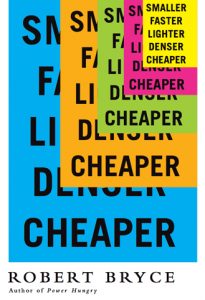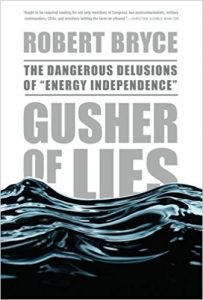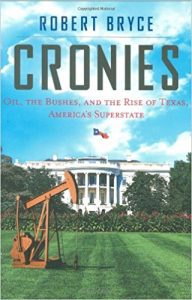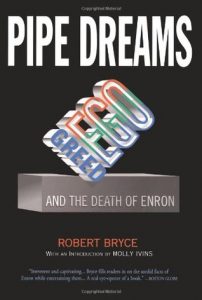[vc_row][vc_column][mk_fancy_title size=”30″ margin_bottom=”0″ font_family=”none”]
Smaller Faster Lighter Denser Cheaper: How Innovation Keeps Proving the Catastrophists Wrong
[/mk_fancy_title][vc_column_text]

Utilizing on-the-ground reporting from Ottawa to Panama City and Pittsburgh to Bakersfield, Bryce shows how we have, for centuries, been pushing for Smaller Faster solutions to our problems. From the vacuum tube, mass-produced fertilizer, and the printing press to mobile phones, nanotech, and advanced drill rigs, Bryce demonstrates how cutting-edge companies and breakthrough technologies have created a world in which people are living longer, freer, healthier, lives than at any time in human history.
The push toward Smaller Faster Lighter Denser Cheaper is happening across multiple sectors. Bryce profiles innovative individuals and companies, from long-established ones like Ford and Intel to upstarts like Aquion Energy and Khan Academy. And he zeroes in on the energy industry, proving that the future belongs to the high-power-density sources that can provide the enormous quantities of energy the world demands.
The tools we need to save the planet aren’t to be found in the technologies or lifestyles of the past. Nor must we sacrifice prosperity and human progress to ensure our survival. The catastrophists have been wrong since the days of Thomas Malthus. It has never been more timely to embrace the innovators and businesses all over the world who are making things Smaller Faster Lighter Denser Cheaper.[/vc_column_text][vc_row_inner][vc_column_inner width=”1/4″][mk_image src=”https://robertbryce.com/wp-content/uploads/2017/08/amazon_logo.png” image_size=”full” link=”https://www.amazon.com/Smaller-Faster-Lighter-Denser-Cheaper/dp/1610392051″][/vc_column_inner][vc_column_inner width=”1/4″][/vc_column_inner][vc_column_inner width=”1/4″][/vc_column_inner][vc_column_inner width=”1/4″][/vc_column_inner][/vc_row_inner][/vc_column][/vc_row][vc_row][vc_column][mk_padding_divider size=”30″][/vc_column][/vc_row][vc_row][vc_column][mk_fancy_title size=”30″ margin_bottom=”0″ font_family=”none”]
Power Hungry
[/mk_fancy_title][vc_column_text]

Armed with a supertanker-load of fully footnoted facts and a panoply of revealing graphics, Bryce explains why most of the hype about renewable energy and “green” technology is just that – hype. Using elementary math and basic physics, he shows why renewable sources like wind and solar are not “green” and why they cannot provide the scale of energy that the world demands. He goes on to eviscerate the notion that the US wastes huge amounts of energy. Indeed, the facts show that over the past three decades the US has been among the world’s best at reducing its energy intensity, carbon intensity, and per-capita energy use.
Electric cars? Bryce explains why they are the Next Big Thing…and always will be. T. Boone Pickens? Simple math shows that the Dallas-based billionaire, and his much-ballyhooed Pickens Plan, are all hat and no cattle. Denmark as a model for being “energy smart”? Despite huge increases in wind generation capacity, the numbers show that Denmark has not reduced its coal consumption or carbon dioxide emissions.
Power Hungry delivers a smart, contrarian view of what America has “in the tank,” and what will be needed to transform the gargantuan global energy sector.[/vc_column_text][vc_row_inner][vc_column_inner width=”1/4″][mk_image src=”https://robertbryce.com/wp-content/uploads/2017/08/amazon_logo.png” image_size=”full” link=”https://www.amazon.com/Power-Hungry-Myths-Energy-Future/dp/1586489534/ref=sr_1_2?s=books&ie=UTF8&qid=1378995187&sr=1-2&keywords=power+hungry”][/vc_column_inner][vc_column_inner width=”1/4″][/vc_column_inner][vc_column_inner width=”1/4″][/vc_column_inner][vc_column_inner width=”1/4″][/vc_column_inner][/vc_row_inner][/vc_column][/vc_row][vc_row][vc_column][mk_padding_divider size=”30″][/vc_column][/vc_row][vc_row][vc_column][mk_fancy_title size=”30″ margin_bottom=”0″ font_family=”none”]
Gusher of Lies: The Dangerous Delusions of Energy Independence
[/mk_fancy_title][vc_column_text]

All of them are full of methane. Energy independence is neither desirable nor doable. America requires too much energy, and the $5 trillion-per-year global energy business is just too interconnected for the U.S. to simply withdraw from it. Gusher of Lies shows why the U.S. must continue buying foreign energy for decades to come, including crude oil from Canada and Saudi Arabia, gasoline from Venezuela, natural gas from Trinidad, coal from Columbia, and uranium from Australia. It explains why Brazil, often held up as a shining example of ethanol’s viability, is actually a classic example of the redeeming power of oil.
To read the first chapter, click here.[/vc_column_text][vc_row_inner][vc_column_inner width=”1/4″][mk_image src=”https://robertbryce.com/wp-content/uploads/2017/08/amazon_logo.png” image_size=”full” link=”https://www.amazon.com/Gusher-Lies-Dangerous-Delusions-Independence/dp/158648690X/ref=sr_1_1?s=books&ie=UTF8&qid=1378995520&sr=1-1&keywords=gusher+of+lies”][/vc_column_inner][vc_column_inner width=”1/4″][/vc_column_inner][vc_column_inner width=”1/4″][/vc_column_inner][vc_column_inner width=”1/4″][/vc_column_inner][/vc_row_inner][/vc_column][/vc_row][vc_row][vc_column][mk_padding_divider size=”30″][/vc_column][/vc_row][vc_row][vc_column][mk_fancy_title size=”30″ margin_bottom=”0″ font_family=”none”]
Cronies: Oil, the Bushes, and The Rise of Texas, America’s Superstate
[/mk_fancy_title][vc_column_text]

Cronies show how Texas turned its vast energy resources into political power, and how a small group of Texas corporations, lawyers and politicians use that power to protect and defend their own economic interests.
This book also:
Provides a provocative analysis of the Second Iraq War, an event that mimics actions taken by another Texas governor, who like George W. Bush, was an oilman-turned-politician. In August of 1931, Governor Ross Sterling ordered the armed invasion of several counties in East Texas, a region that contained the world’s biggest oil field. Sterling’s move allowed Texas to control the supply, and therefore, the price, of oil for the next four decades.
Demonstrates how George W. Bush’s victory during the Florida Recount of 2000 was the quintessential example of the Lone Star State’s enormous clout. To win, the younger Bush needed three things: lawyers, airplanes and money. He got all of them from Texas.
Details for the first time the central role that the Bush family’s lawyer, James A. Baker III, the man who led the Bush forces during the Florida recount, has played in the Bushes’ political dynasty. And it shows how he’s made millions of dollars from his crony connections.
Like it or not, and many Americans don’t — Texas dominates the United States. And because of that, Texans are now running the world. This book tells how they got there, and alas, why they just might stay.[/vc_column_text][vc_row_inner][vc_column_inner width=”1/4″][mk_image src=”https://robertbryce.com/wp-content/uploads/2017/08/amazon_logo.png” image_size=”full” link=”https://www.amazon.com/Cronies-Bushes-Texas-Americas-Superstate/dp/1586481886/ref=sr_1_1?s=books&ie=UTF8&qid=1378995350&sr=1-1&keywords=cronies”][/vc_column_inner][vc_column_inner width=”1/4″][/vc_column_inner][vc_column_inner width=”1/4″][/vc_column_inner][vc_column_inner width=”1/4″][/vc_column_inner][/vc_row_inner][/vc_column][/vc_row][vc_row][vc_column][mk_padding_divider size=”30″][/vc_column][/vc_row][vc_row][vc_column][mk_fancy_title size=”30″ margin_bottom=”0″ font_family=”none”]
Pipe Dreams: Greed, Ego, and the Death of Enron
[/mk_fancy_title][vc_column_text css=”.vc_custom_1502869951311{margin-bottom: 0px !important;}”]

“Robert Bryce is a rollicking writer in classic Texas gunslinger mode — and it would be hard to think of a style more appropriate for a tale of varmints as lowdown as the Enron gang. Bryce has a rare ability to explain complex financial concepts clearly, combined with a breezy, colloquial style that makes his story a page turner. —Salon.com
Publishers Weekly magazine named Pipe Dreams one of the best nonfiction books of 2002. The magazine, the leading journal for the book business, called it a “standout.” In its review, it said, “Finally, an Enron book that actually explains what happened at Enron. This isn’t just the first book to make sense out of the debacle; it’s a vivid cautionary tale about the consequences of the lurid excesses-personal and professional.” “Bryce blends investigative reporting with a funky, freewheeling style that fills the reader in on the sordid facts of Enron while entertaining them. Greed and sex ooze from the pages as Bryce gleefully examines every lurid detail of the Enron shenanigans.” — Boston Globe
“There are sure to be many accounts of Enron’s collapse, but Bryce’s gossipy version will be hard to beat for sheer readability.” — Kirkus Reviews “a comprehensive piece of investigative journalism.” —Booklist
Read an excerpt from Pipe Dreams:
Diva of the Deal, a look at one of Enron’s most aggressive profiteers, Rebecca Mark. Published in the Houston Press, October 10, 2002.
Hear Robert Bryce discuss Enron on national radio:
Interview with Terry Gross on Fresh Air.
Interview with Lynn Neary on Talk of the Nation about Enron and corporate governance.[/vc_column_text][vc_row_inner][vc_column_inner width=”1/4″][mk_image src=”https://robertbryce.com/wp-content/uploads/2017/08/amazon_logo.png” image_size=”full” link=”https://www.amazon.com/Robert-Bryce-Dreams-Greed-Death/dp/B008VQWZDK/ref=sr_1_3?s=books&ie=UTF8&qid=1378995584&sr=1-3&keywords=pipe+dreams+robert+bryce”][/vc_column_inner][vc_column_inner width=”1/4″][/vc_column_inner][vc_column_inner width=”1/4″][/vc_column_inner][vc_column_inner width=”1/4″][/vc_column_inner][/vc_row_inner][/vc_column][/vc_row]
